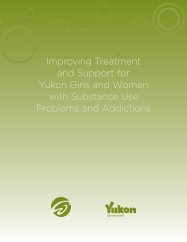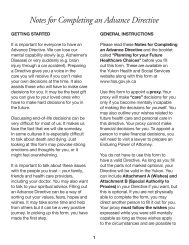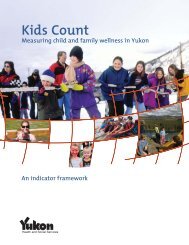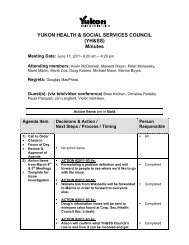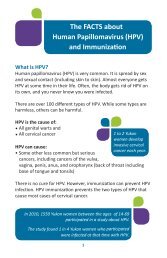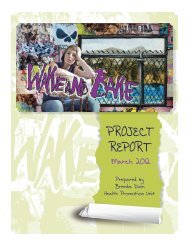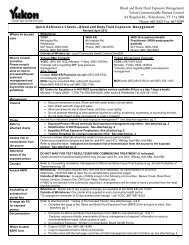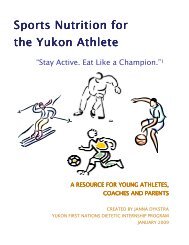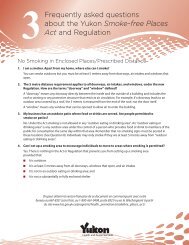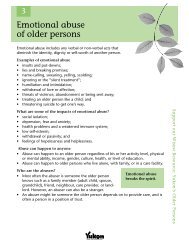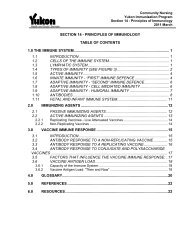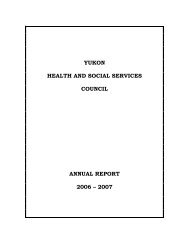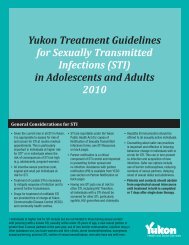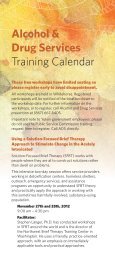Women and Alcohol: A women's health resource [2326.26 KB ]
Women and Alcohol: A women's health resource [2326.26 KB ]
Women and Alcohol: A women's health resource [2326.26 KB ]
You also want an ePaper? Increase the reach of your titles
YUMPU automatically turns print PDFs into web optimized ePapers that Google loves.
<strong>Women</strong> <strong>and</strong> <strong>Alcohol</strong><br />
17<br />
the woman to wait two years to deal with<br />
her other problems. Now, trauma pervades<br />
everything we do. You can’t separate recovery<br />
<strong>and</strong> trauma. <strong>Women</strong> may not be drinking, but<br />
they will still be very, very troubled if you<br />
don’t address the underlying issues.”<br />
“Braiding” is the approach used at<br />
Jean Tweed: the ability to move back <strong>and</strong><br />
forth between a woman’s addiction <strong>and</strong><br />
her other challenges. It might be violence,<br />
sexual abuse, extreme poverty, a traumatic<br />
childhood. Rare is the woman without a<br />
troubling past or present.<br />
“Someone can’t go through substance<br />
use who isn’t anxious, depressed, having<br />
issues related to self-harm or perhaps food,”<br />
says Bradley. “We meet women where they<br />
are. We know that some behaviours may<br />
manifest themselves. Someone may begin to<br />
have flashbacks — which can be extremely<br />
painful for both the clients <strong>and</strong> the staff. We<br />
try to help them see the links. We hear some<br />
of the most unbelievable stories — there is<br />
immense courage here.”<br />
“The central question isn’t: ‘What’s<br />
wrong with this woman?’ It’s: ‘What<br />
happened to this woman?’ ” This is the<br />
voice of Nancy Poole, director of research<br />
<strong>and</strong> knowledge translation at the British<br />
Columbia Centre of Excellence for<br />
<strong>Women</strong>’s Health. With more than 30 years’<br />
experience in the field of addictions, Poole<br />
is a dynamo with her finger in dozens of<br />
projects, including a new book on trauma.<br />
She is talking about the importance of what<br />
is known in the field as trauma-informed<br />
care, which gives credence to the woman’s<br />
past or present, <strong>and</strong> the role it plays in her<br />
addiction. “We miss the biggest part of the<br />
story,” says Poole, “if we don’t link the<br />
addiction to the rest of the woman’s life.”<br />
If you head to the most renowned of<br />
all treatment centres, Hazelden outside<br />
Minneapolis, you will hear a similar story.<br />
Brenda Servais is a counsellor for 16- to<br />
21-year-olds, <strong>and</strong> she is blunt: “Trauma? Not<br />
100 per cent, but a very high number. There’s<br />
a lot of sexual trauma, whether it happened<br />
when they were sober or under the influence.<br />
A lot of rape. Certainly PTSD. And we can<br />
see a rise in their substance use right after the<br />
event.”<br />
Sheila Murphy, who runs the women’s<br />
program at Hazelden, cites the stigma that<br />
still lingers around the act of getting help.<br />
“Our culture has changed, but for a woman,<br />
the stigma of addiction is still very bad.<br />
Annie Akavak is in the process of putting her life back together. It has been a long road.<br />
There’s a stigma for women who have gone<br />
to treatment. Which is a shame because here,<br />
women are taking time out of their lives to do<br />
some self-discovery, to underst<strong>and</strong> at a deeper<br />
level how they want to live. It takes great<br />
courage to make changes in their lives.”<br />
‘We miss the biggest<br />
part of the story if we<br />
don’t link the addiction<br />
to the rest of the<br />
woman’s life.’<br />
– Nancy Poole<br />
At the Jean Tweed Centre, helping clients<br />
change their lives often includes assisting<br />
mothers with their parenting skills or custody<br />
problems. Twenty-two years ago, a young<br />
woman barged into Bradley’s office with her<br />
7-year-old, desperate for help. She said, “I<br />
have to give my kid up to Children’s Aid —<br />
he’s out of control.” The young woman had<br />
been through Jean Tweed <strong>and</strong> felt a part of<br />
the place. “I thought to myself, ‘We have an<br />
opportunity here,’ ” says Bradley.<br />
With that, Jean Tweed began offering child<br />
care so that parents could attend evening<br />
sessions. Ten years ago, they started the<br />
Pathways to Healthy Families, an outreach<br />
program aimed at helping women who are<br />
pregnant or parenting children up to the age<br />
of 6. They placed staff outreach workers in<br />
shelters, a maternity hospital, the aboriginal<br />
community, looking for women who<br />
needed help finding housing, prenatal care,<br />
midwifery, counselling for substance abuse<br />
<strong>and</strong> more. They built bridges with agencies<br />
that were historically adversaries: Children’s<br />
Aid, the court system.<br />
As part of the Pathways program,<br />
they developed the Moms <strong>and</strong> Kids Too<br />
program, known as MK2: tailoring the<br />
essence of the classic 21-day treatment<br />
program of Jean Tweed to a young mother’s<br />
schedule. Treatment is spread over seven<br />
weeks, three days a week, with child care<br />
in their licensed facility. Workshops on<br />
parenting, play routines <strong>and</strong> attachment<br />
are incorporated, along with sessions on<br />
LUCAS OLENIUK/TORONTO STAR


![Women and Alcohol: A women's health resource [2326.26 KB ]](https://img.yumpu.com/22340649/17/500x640/women-and-alcohol-a-womens-health-resource-232626-kb-.jpg)
